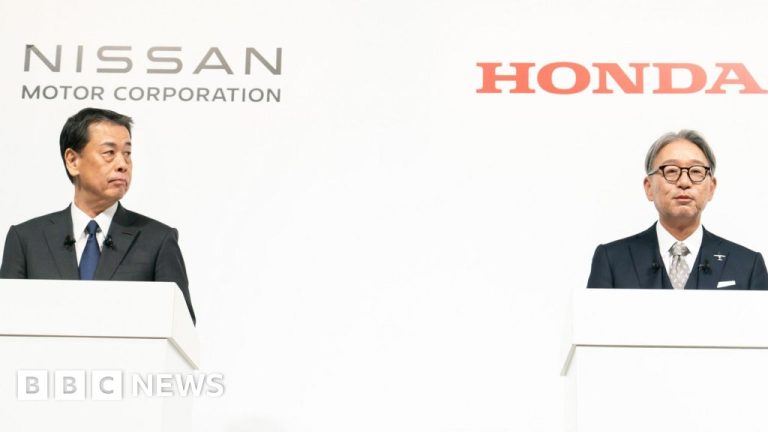Honda and Nissan are considering a merger as the two Japanese companies seek to combat competition from China's auto industry.
This integration would create one of the world's largest automobile manufacturers, alongside Toyota, Volkswagen, General Motors and Ford.
The potentially multi-billion deal to combat “rising Chinese power” was a key driver of the plan, Honda Chief Executive Toshihiro Mibe said.
Mr Mibe said a “fightback” plan must be in place by 2030 or they risk being “beaten” by their rivals.
Becoming one of the auto industry's biggest brands would allow companies to reclaim space in the growing electric car market, which is increasingly dominated by Chinese-made electric vehicles, including BYD , which pose a threat to some of the world's largest manufacturers. most famous car manufacturers.
“There is a rise in Chinese power and emerging forces and the structure of the auto industry is changing,” Mr. Mibe told reporters at a news conference announcing the merger talks.
Growing competition in China has left many automakers struggling to compete, as falling labor and manufacturing costs make local companies more nimble and able to sell their products at lower prices than their counterparts. foreign counterparts, which makes them much more attractive to buyers.
This has enabled China to become the world's largest producer of electric vehicles.
In October, EU officials said the Chinese state was unfairly subsidizing its electric vehicle makers and announced heavy taxes on electric vehicle imports from China to the EU, after the majority of member states supported this project. Tariffs are expected to rise between 10% and 45% over the next five years, but some fear this could increase electric vehicle prices for buyers.
Total sales of Nissan and Honda are more than $191 billion (£152 billion), Nissan chief executive Makoto Uchida said.
In March, the two Japanese automakers agreed to explore a strategic partnership for electric vehicles (EVs).
“Negotiations started because we believe we need to build capacity to fight them, including against current emerging forces, by 2030. Otherwise, we will be defeated,” Mibe said.
He added that the deal was not a bailout for Nissan, which is facing declining sales.
In November, Nissan announced it would cut about 9,000 jobs as part of a global production cut to cope with falling sales in China and the United States. These cuts mean its global production will be reduced by a fifth.
Nissan, once a symbol of the Japanese automaker's strength, has spent recent years trying to regain its footing following the arrest of its longtime CEO, Carlos Ghosn. Mr. Ghosn was accused of financial misconduct when he fled Japan in 2019 and is currently the subject of an Interpol Red Notice, which calls on law enforcement agencies around the world to track down and arrest him. arrest a person. Mr. Ghosn, currently in Lebanon, told reporters in December that Nissan's merger plans were an act of panic and desperation.
Mr Mibe said any merger would depend on Nissan's turnaround.
The merger, which would include Mitsubishi – of which Nissan is the largest shareholder – would allow the three companies to share resources against other electric vehicle competitors such as Tesla. Honda and Nissan agreed in March to cooperate in their electric vehicle businesses and deepened their ties in August by agreeing to work together on batteries and other technologies.
However, any deal is likely to face intense political scrutiny in Japan as it could lead to job cuts, while Nissan is expected to end its alliance with French carmaker Renault.

